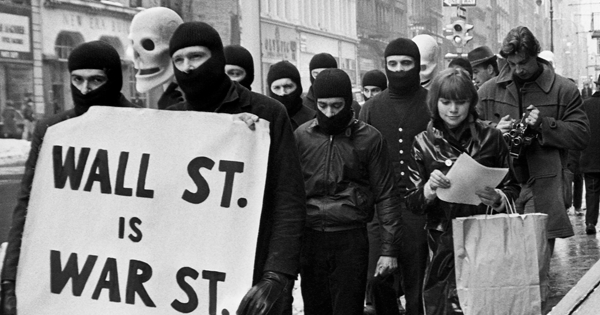
Anarchism, in the political sense, has been around for more than 200 years—and even longer, if you read the New Testament or the Taoist philosopher Laozi a certain way—and yet few other political movements engender quite as much confusion, or controversy.
Andrew Cornell’s project in Unruly Equality is to bring some order to the mayhem. His book, a history of American anarchism in the 20th century, outlines the evolution of this radical political philosophy from 1915 to 1975 and spans everything from the New Deal to punk rock, from atomic warfare to the Civil Rights Movement. Far from fading away after the outbreak of World War I, anarchism played a role in the major political events of the past hundred years, well before the publicity of the Occupy Wall Street movement.
Since the eighteenth century, at least, the word anarchy has signified a condition of chaos, disorder, and personal vulnerability owing to the absence of a center of power capable of enforcing rules; it is still frequently used in this way today. In 1840, however, a French radical named Pierre-Joseph Proudhon reclaimed the term anarchy in a fashion similar to the ways in which the word queer and certain racial slurs have, in recent decades, been adopted and given positive connotations by the groups of people they were meant to denigrate. Proudhon argued that under conditions of profound economic inequality, such as those that reigned in industrializing Europe, the primary role of political states was to legitimate and defend the wealth of a minority. It was this joint exercise of economic and military power that actually made the poor vulnerable (to hunger, disease, beatings) and ensured society would remain chaotically ridden with conflict. He had faith that people could live harmoniously if state coercion and the lopsided distribution of resources was done away with, famously declaring, “Liberty is not the daughter but the mother of order.” For Proudhon, then, to be an anarchist was to fight the enforcement of misery upon common people, and he therefore wore the term as a badge of honor. Other European socialists soon elaborated upon this conceptualization, and by the 1860s anarchism had emerged as a political ideology and a specific tendency within the broader labor and radical movements of Europe. By the end of the century, such ideas had spread around the world.
Although Proudhon’s linguistic reclamation may have been conceptually brilliant, the meaning he gave to the term never fully displaced its earlier connotations. As a result, for more than 150 years, anarchists have felt compelled to begin their speeches and writings with a clarification of what they mean by anarchy. …
These varied meanings of anarchism often congeal in strange ways. In August 2014 the New York Times Magazine featured a cover story about the appeal of libertarian senator Rand Paul among young Republican voters. The illustrator mimicked a flier for the legendary punk band Minor Threat and snuck a hand-drawn circle-A symbol into the magazine’s masthead. A year earlier, when Tea Party–affiliated Republicans forced a federal government shutdown, Senate Majority Leader Harry Reid denounced members of the caucus as “anarchists” who needed to “get a life.” Reid explained, “When I was in school, I studied government and I learned about the anarchists. Now, they were different than the Tea Party because they were violent. . . . [Tea Party members are] not doing physically destructive things to buildings and people, directly, but they are doing everything they can to throw a monkey wrench into every form of government.” In these instances, all of the term’s connotations were at play: anarchism as any antigovernmental politics, anarchism as violence, anarchism as nineteenth-century anachronism, anarchism as juvenile behavior and punk rock.
Excerpted from Unruly Equality: U.S. Anarchism in the Twentieth Century, by Andrew Cornell, published by the University of California Press. © 2016 by The Regents of the University of California.


